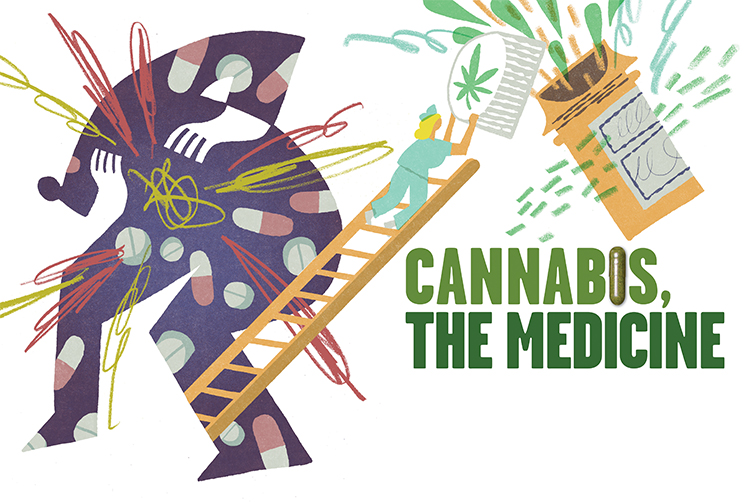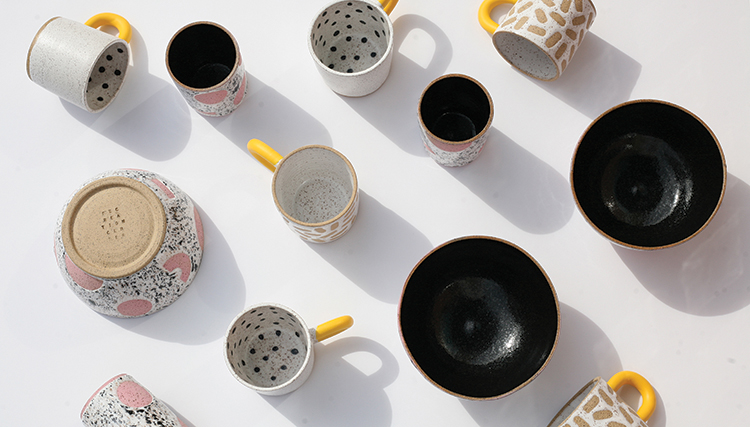Coming to a neighborhood near you.
By Sue Spolan
When Brian Dwyer found out that his infant son, Waldo, had a rare form of cancer, his first stop was the world-renowned Children’s Hospital of Philadelphia.
“There were tumors growing in his eyeballs,” explains Dwyer, whom you may know as the founder of Pizza Brain, the instantly beloved Kensington restaurant that garnered national acclaim upon opening. Waldo has a very rare but treatable form of cancer known as bilateral retinoblastoma. His blindness was the first sign that something was terribly wrong.
“I stared modern medicine in the face, in one of the best children’s hospitals in the U.S. The general treatment is hard drugs and steroids,” he says. “They treat it with chemo—or remove the eyes.”
Dwyer recalls it as a painful time for the whole family. “Those first few chemo sessions were one of the darkest periods of my life,” he says.
Two family friends came to the rescue, suggesting cannabis oil as a nontoxic alternative to the devastating chemotherapy the baby was going through.
Though he can’t say whether it was the cannabis or chemo, the Dwyer family saw dramatic improvements immediately upon administering the cannabis, and Waldo felt great relief. The cannabis oil appeared to work miracles.
So, Dwyer bought it under the table.
“I was broke, working 50 hours a week, and I felt like I had to keep it a secret. When the medical marijuana bill passed, it didn’t solve our problem,” says Dwyer, who knew it would be three years before his son could get legal cannabis in Philadelphia.
So, a year ago, Dwyer moved with his wife, Danielle, and Waldo to Washington state to continue pursuing alternative treatment for his son, who is no longer blind. Today, Dwyer reports that Waldo is tumor-free and “growing like a young giraffe.”
The Power of Prescription
One institution at the forefront of medical marijuana research is Thomas Jefferson University’s Lambert Center for the Study of Medicinal Cannabis and Hemp, the first of its kind in the U.S. Australian multimillionaire Barry Lambert gave $3 million to the center, and a half-dozen philanthropists have since added $1.5 million in funding.
Dr. Ari Greis plans to be the first physician certified to recommend cannabis at the Rothman Institute of Jefferson Hospital. As a physical medicine and rehabilitation doc, Greis sees patients who suffer from chronic pain. Many of those patients have turned to opioids. Greis envisions real therapeutic benefit from products that are mostly cannabidiol.
“You may be able to get the effect without the high and confusion… Cannabis is so much safer than all these other legal drugs, like tobacco, alcohol and opioids,” says Greis, who has seen the terrible price patients pay when they become addicted to painkillers.
Drug overdose deaths in Pennsylvania increased by 37 percent to a record high in 2016, according to the Drug Enforcement Administration. When you add up all substance related fatalities in Philadelphia for 2016, there were 907 overdose deaths.
As a physician, Greis wants to have control over cannabis dosing and frequency, just as he would with any other medication. “There is mounting evidence that cannabis can help us deal with the opioid epidemic,” says Greis, who cites multiple recent studies that associate cannabis use with decreased opiate intake and a significant drop in the use of prescription drugs overall.
Pay, Don’t Stay
Before setting foot in a Pennsylvania cannabis outlet, you’ll pay a $50 application fee to be placed on the patient registry. The card, available to adults 18 and older, enables patients to obtain and possess 30 days’ worth of product. Adults can also apply as caregivers. Parents and guardians can obtain cannabis for children under 18.
There are currently 17 conditions that allow patients to obtain medical cannabis. None of these is a catch-all, “wink wink” diagnosis, such as anxiety or insomnia.
State Sen. Daylin Leach, author of the Pennsylvania medical marijuana bill that became law in April 2016, estimates that the first dispensaries will be operational in spring 2018.
At the outset, these dispensaries will not stock the flowers of the plant. Smoking is not currently a medically approved form of administration. Rather, all products will be packaged as pills, oils, gels, creams, ointments, vaporizers, nebulizers, tinctures and liquids. Dispensaries will stock products, classified by strain, that are grown and processed in 12 state-approved facilities.
While the marijuana plant contains hundreds of chemical compounds, the general focus of medical cannabis centers on two cannabinoids: THC (tetrahydrocannabinol) and CBD (cannabidiol). The former provides the psychoactive effect associated with getting high, while the latter is said to erase pain without the high. All manufactured cannabis products contain one or the other, or a combination of both.
Chicago-based Cresco Yeltrah, which was granted both grower-processor and dispensary licenses in Pennsylvania, plans to offer a modified version of its products now on shelves in Illinois dispensaries, but notes that the formulation will adhere to stringent Pennsylvania laws.
A Family Friendly Dispensary in Fishtown
The future Philadelphia cannabis dispensary is the architectural equivalent of a plain brown wrapper: intentionally easy to miss. Medical marijuana outlets aspire to be health and wellness centers, not hippie retreats with dab bars and Indian print bedspreads. If you’ve ever seen one of the dispensaries in New Jersey, you are familiar with this new vernacular.
You will not know that Fishtown’s Restore Integrative Wellness Center, operated by Steve and Anna O., is a dispensary. Steve is a physical therapist and acupuncturist, and Anna is a pharmacist.
“We are a husband and wife team. We’ve created a clinical model where our professions could merge. It’s a holistic health care institution,” says Steve, who grew up in South Philadelphia and works with geriatric patients in long-term care facilities. He became concerned by the volume of pills patients took. “That triggered something in me. I bet half of those pills could be eliminated if cannabis came into play.”
Steve and Anna O., who also run Reboot Integrative Wellness Center in Elkins Park (not a dispensary), were delighted to be approved in the first round. “We did not come in just to set up shop as retail investors. Our team is as clinical as you’re going to get.”
“There will be no pot leaves on the front of the building,” according to interior designer Christina Casile, who, along with architect Erin Monaghan, are responsible for the look and feel of Restore.
Monaghan and Casile are partners in the newly formed Design 710. Their challenge was to transform a disused 5,000-square-foot warehouse space at 957 Frankford Ave. into a health care center. The client wanted to create a sense of peace and wellness and move away from the secretive, illegal legacy of cannabis.
“If a parent brings a child, the dispensary operators want them to feel comfortable checking in,” explains Monaghan, who aims for a soothing, comfortable experience. It will look like a health care facility. “We want it to be inviting and safe,” adds Casile.
Once you enter the building, you’ll see a white waiting room with clean lines and a modern, minimal sensibility. Call it a mix between a doctor’s office and a spa. Behind closed doors that open upon invitation, you’ll find yourself in a secure product room filled with glass cases and staffed by medical professionals.
While dispensaries in other states have budtenders, Pennsylvania’s dispensaries will have licensed pharmacists on hand to counsel patients who have qualified for cannabis treatment. In the case
of Restore, which will offer massage, acupuncture and other therapies, there will also be a licensed physical therapist on duty at all times. Patients will not be allowed to use products inside the dispensary.
Restore is one of three planned Philadelphia dispensaries. The other two are in Northeast Philly. One of those, in an old Chi-Chi’s across from the former Franklin Mills Mall, is now tied up in a court battle. The other is at 8900 Krewstown Road, and there’s no word yet on an opening date.
No Room for Mom-and-Pop Farms or Shops
Already, the cannabis industry in Pennsylvania is bringing money into the state.
Each grower-processor application has paid a $10,000 nonrefundable fee and a $200,000 refundable permit fee to the state. The applicant has to provide proof of $2 million in capital. Dispensaries carry a lower price tag: a $5,000 application fee and $30,000 refundable permit fee, with proof of $150,000 in capital.
The state has divided application approval into several phases. In Phase One, 27 dispensary operators and 12 grower-processors have received the green light, as noted on the Pennsylvania Department of Health website. Phase Two approvals are expected in the first quarter of 2018, bringing the total number of dispensaries statewide to 50 and grower-processors to 25.
The state’s Office of Medical Marijuana reports that it received a total of 457 applications: 177 for grower-processors and 280 for dispensaries. That’s a total of $3,170,000 in nonrefundable fees and $43,800,000 in refundable fees for the state.
Entrepreneurs with resources and business connections are poised to profit from legal marijuana; those operating on the black market will continue to risk jail time.
Legalized Recreational Use on the Horizon in NJ and PA
The next step for Pennsylvania, according to Sen. Leach, is the passage of a recreational-use bill. PA Bill 213, which proposes that adult-use cannabis be sold through the state liquor store system, is now sitting in the Law and Justice Committee.
Today in decriminalized Philadelphia, police officers may issue a $25 ticket for possessing fewer than 30 grams of cannabis. If you’re caught smoking, expect a $100 ticket, but one that is largely not enforced. According to the city’s chief administrative officer, only about 20 percent of the 7,000 tickets issued so far have been paid since the law went into effect in 2015.
“I’m going to my first ribbon cutting in April,” says Leach, who’s been working on legalizing marijuana in Pennsylvania since 2013. He is optimistic that recreational-use laws will be passed within the next three to four years , and he looks to legalization in New Jersey as a potential watershed for Pennsylvania.
With recreational cannabis coming to Maryland, Massachusetts and Maine, much of the East Coast will have easy access. If you’ve ever driven to New Jersey or Delaware to pick up wine, you know the drill.
It remains to be seen what pricing will look like when and if recreational use is approved in Pennsylvania. Customers pay dramatically different sales tax in Colorado—and can buy vastly different amounts—depending on the type of dispensary, says Alex Rubin, business
director for the Denver chapter of the National Organization for the Reform of Marijuana Laws (NORML) and budtender in a Denver dispensary. For example, recreational cannabis carries anywhere from a 22 to 29 percent sales tax. On medical products, patients pay only 7 percent.
Rubin loves the quality control of a dispensary system: “In a black market, when you buy from a dealer, you don’t know what you are getting. You don’t know where and how it was grown. In a legitimate economy, cannabis goes through a testing process for pesticides and mold.” Strains, he says, are clearly marked. You’re not just buying a bag of weed. Is this what we can expect in Pennsylvania?
Patients, Be Patient
So far, 29 states plus the District of Columbia allow some form of legalized cannabis. The eight states that have passed recreational cannabis laws all have medical dispensaries as well. The biggest hurdle cannabis faces is federal law, which functions like individual shrink wrap over each state. You can’t transport or sell pot across state lines. Cannabis products must be grown, processed and sold in the same state.
This federal-state mismatch causes all kinds of ripples. Cannabis dispensaries are mostly cash only. Visa and MasterCard don’t want the business. The Internal Revenue Service does not allow dispensaries to take typical deductions. Growers, processors and retailers in Colorado often pay employees in cash, then purchase money orders to pay utilities.
Right now, medical marijuana in Pennsylvania is all about the process and no product. Construction hasn’t yet begun at Restore Integrative Wellness Center. Dr. Greis has yet to hear back from the state about completing the certification process.
Patients and caregivers are now able to register for medical marijuana on the Pennsylvania Department of Health website. It’s a quick process: All you need is the information on your driver’s license.
But for Dwyer and his family, the changes didn’t come soon enough.
“You think I wanted to walk away from a successful business?” he says, thinking back to the time he was broke from buying marijuana under the table, exhausted from lobbying for reform in Harrisburg and worrying every minute about his son. “I miss Philly. I miss pizza. But family has to take priority.”
Stigma is still attached to medical marijuana, especially when it comes to dosing children. But with the experiences of hundreds of patients—including Dwyer’s son—the tide is turning.
In Bellingham, Washington, where he and his family live in a lakeside cabin at the foot of a mountain, Dwyer buys cannabis just like he buys his eggs, bread and milk.
Pennsylvania may get there one day, too.








